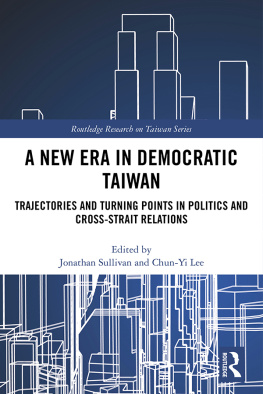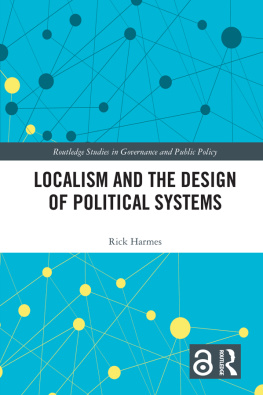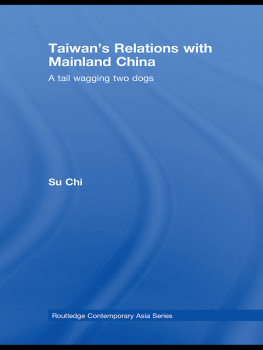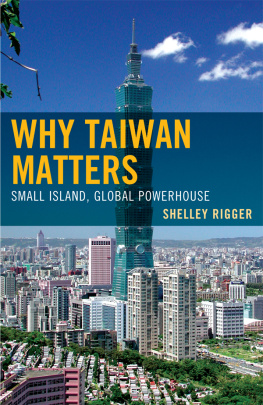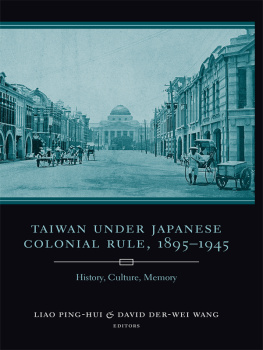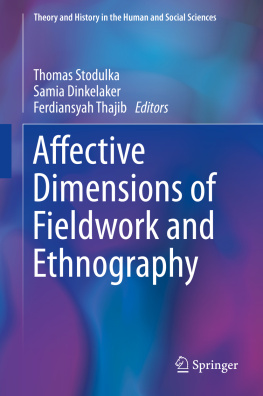E AST A SIA
H ISTORY , P OLITICS , S OCIOLOGY ,
C ULTURE
E DITED B Y
E DWARD B EAUCHAMP
U NIVERSITY OF H AWAII
A R OUTLEDGE S ERIES
E AST A SIA
H ISTORY , P OLITICS , S OCIOLOGY , C ULTURE
E DWARD B EAUCHAMP , General Editor
M ODERN E DUCATION , T EXTBOOKS, AND THE I MAGE OF THE N ATION
Politics and Modernization and Nationalism in Korean Education: 1880-1910
Yoonmi Lee
P ROBLEMS OF D EMOCRATIZATION IN C HINA
Thomas G. Lum
T HE U NKNOWN C ULTURAL R EVOLUTION
Educational Reforms and Their Impact on China's Rural Development, 1966-1976
Dongping Han
M AO'S P REY
The History of Chen Renbing, Liberal Intellectual
Jeanette Ford Fernandez
T HE R OOTS OF J APAN'S E NVIRONMENTAL
P OLICIES
Amy Wong
T HE O RIGINS OF THE B ILATERAL O KINAWA
P ROBLEM
Okinawa in Postwar US-Japan Relations, 1945-1952
Robert D. Eldridge
South-South Transfer
A Study of Sino-African Exchange
Sandra Gillespie
S TUDYING THE E NEMY
Japan Hands in Republican China and Their Quest for National Identity
Christiane I. Reinhold
S ELF -R ELIANCE OR S ELF -D ESTRUCTION?
Success and Failure of the Democratic People's Republic of Korea's Development Strategy of Self-Reliance, juche
Phillip H. Park
T HIRD D ELIGHT
The Internationalization of Higher Education in China
Rui Yang
S TRUGGLE FOR N ATIONAL S URVIVAL
Eugenics in Sino-Japanese Contexts, 1896-1945
Yuehtsen Juliette Chung
R ETHINKING J APAN'S I DENTITY AND
I NTERNATIONAL R OLE
An Intercultural Perspective
Susanne Klien
J APAN'S F OREIGN P OLICY M ATURATION
A Quest for Normalcy
Kevin J. Cooney
V ILLAGE , M ARKET AND W ELL -B EING IN A
R URAL C HINESE T OWNSHIP
Tamara Perkins
H ISTORY OF J APANESE P OLICIES IN
E DUCATION A ID TO D EVELOPING C OUNTRIES ,
1950s-1990s
The Role of the Subgovernmental Processes
Takao Kamibeppu
E NGINEERING THE STATE
The Huai River and Reconstruction in Nationalist China, 1927-1937
David A. Pietz
T HE P OLITICS OF L OCALITY
M AKING A N ATION OF C OMMUNITIES
IN T AIWAN
HSIN-YI LU
Published in 2002 by
Routledge
270 Madison Ave,
New York NY 10016
www.routledge-ny.com
Published in Great Britain by
Routledge
2 Park Square, Milton Park,
Abingdon, Oxon, OX14 4RN
www.routledge.co.uk
Routledge is an imprint of the Taylor & Francis Group
Transferred to Digital Printing 2010
Copyright 2002 by Taylor & Francis Books, Inc.
All rights reserved. No part of this book may be reprinted or reproduced or utilized in any form or by any electronic, mechanical, or other means, now known or hereafter invented, including photocopying and recording, or in any information storage or retrieval system, without permission in writing from the publisher.
10 9 8 7 6 5 4 3 2 1
Library of Congress Cataloging-in-Publication Data
Lu, Hsin-yi.
The politics of locality : making a nation of communities in
Taiwan / Hsin-yi Lu.
p. cm. (East Asia : history, politics, sociology, culture)
Indues bibliographical references and index.
ISBN 0-415-93433-8
1. TaiwanPolitics and government1988- I. Title. II. East Asia
(New York, N.Y.)
DS799.847.L78 2002
951.24'905dc21 2002021962
Publisher's Note
The publisher has gone to great lengths to ensure the quality of this reprint
but points out that some imperfections in the original may be apparent.
For my parents, Ing-Jiau Shy and Chang-Hui Lu
C ONTENTS
L IST OF F IGURES
A CKNOWLEDGEMENTS
T HE CORE PLEASURE OF ACADEMIC LIFE, IN MY VIEW, STEMS FROM THE OPPORTUnities to work with great minds. Without the longing for an intellectually inspiring and supportive community, many of us would not have sacrificed financial security to pursue this less-celebrated path. Ever since the first day I started my dissertation I have been looking forward to this moment of articulating my gratitude to teachers, friends, and family.
Where and with whom shall I begin to recount my academic journey? Perhaps I should start with the core course in fall 1994, taught by John Pemberton. lt was my first academic endeavor in the United States, and Pemberton's excellent choice of course readings greatly restored my faith in the anthropology discipline. During the subsequent quarter, David Spain served as instructor. His demand for excellent papers was a timely warning to my sloppy writing. Next was Tani Barlow who taught feminist theories in fall 1995. She embodied great passion and took genuine curiosity in our projects. In the following year I attended Marilyn Ivy's small seminar concerning critical Japan studies, and benefited from her sharp mind and eloquent presentation. Any attentive reader can detect the phantomistic presence of her book The Discourses of the Vanishing throughout my project.
My advisor Ann Anagnost has always been a role model for me, both with her intellectual intensity and her hearty, caring, personality. The numerous comments that she placed on the margins of my earlier drafts lured me out of the mud and inspired me to make theoretical efforts in every step of the writing process. Stevan Harrell suggested this topic back in spring 1997, when I was fanatically searching a proper topic for dissertation research. He visited my field sites the year after and offered much encouragement. Jack Ferguson kindly volunteered as reader near the end of the process and offered discerning suggestions on my writing and organization.
Most of my fieldwork was conducted from October 1997 to September 1998. lt was funded by the China Times Cultural Foundation, Chiang Ching- Kuo International Exchange Foundation, and an eight-month visiting scholarship provided by the National Youth Commission of Taiwan through the generous support of Professors Chuang Ying-chang and Chen Hsiang-shui at the Institute of Anthropology, National Tsing Hua University. I received so much help in the field that it is virtually impossible to name all the kind souls that have assisted me. Nonetheless, I would like to thank specifically Dr. Chen Chi-nan and his team who connected me with the culture workers in Man and shared their vision with me. Lin Ruimu and Baimi Community Development Association accommodated me and showed me the real value of community through their warm supports and delicious meals. Ji Rongda, Su Wenkui, Xu Huiming, and the numerous men and women affiliated with Tanshui's local organizations provided invaluable opportunities for me to experience the excitement and frustration of conducting cultural work in a complex local society. I also feel fortunate about my intensive work with the llan Cultural Center (now the llan Cultural Bureau), which provided a unique opportunity to actually participate in the bureaucracy of cultural administrations.
The following friends accompanied me as this project matured: The theoretical framework was largely configured during rewarding study sessions with Ren Hai and Eric Thompson in spring 1999. Janet Upton and Almaz Han accommodated me when I returned to Seattle after the field research, and soothed my returning anxiety with their warmth and generosity. I shall always miss Peng Wenbin's Sichuan cuisine, around which occurred a lot of memorable conversations about academia and cross-strait politics. David Davies has shared similar struggles and stress since our first year in graduate school. My dissertation pals, Harriet Phinney and Maureen Feeney, gave useful comments and encouragement on earlier drafts. Finally, thanks to the China/Taiwan groupChen Yi-ling, Hsu Ching-wen, Fan Ke, Yan Hairong, Nick Pazderic, and Taipang Sasalawith whom I spent countless times of intellectual and recreational gatherings.


